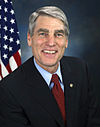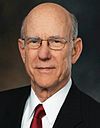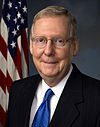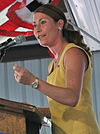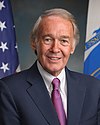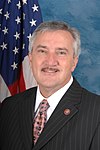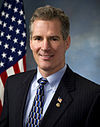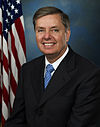Election to the United States Senate 2014
| Election to the United States Senate 2014 | |||||
| 4th November 2014 | |||||
|
|||||
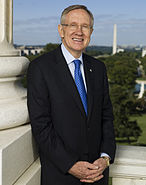
|

|
||||
| Group leader | Harry Reid | Mitch McConnell | |||
| Political party | Democratic Party | Republican Party | |||
| Sit before the election | 53 * | 45 | |||
| Seats after the election | 44 * | 54 | |||
| Profit loss | −9 | +9 | |||
| Total votes | n / A | n / A | |||
| Share of votes | n / A | n / A | |||
| * 2 Independents formed a faction with the Democrats before the election | |||||
 |
|||||
| Results by state | |||||
|
Majority leader before the election Harry Reid Democrat |
Post-election majority leader Mitch McConnell Republican |
||||
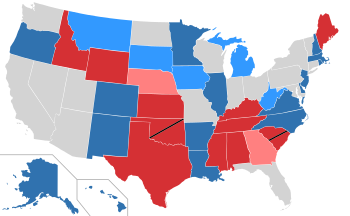
The United States Senate election took place on November 4, 2014 . There were a total of 36 seats from the US Senate , which has 100 members, to choose from: all 33 seats in class two and three seats (one each from the states of Oklahoma , Hawaii and South Carolina ) from senators who had left office prematurely. The senators were elected by direct election for six years by the citizens of the state they represent in the US Senate. The three successors were only elected for the remaining term of office of the previous senators, until the next regular election for this seat (i.e. for two or four years). In his new composition of the Senate first appeared on January 3, 2015 together .
The internal party primaries to determine the respective candidates took place between March and September 2014, depending on the state, according to different procedures, depending on the state's electoral law. In the main election on November 4, 2014, the candidate with the most votes (with the exception of Louisiana and Georgia ) was elected; in Louisiana and Georgia there would have been a runoff if no candidate had received more than 50% of the votes in the main election.
In the previous Senate (2012–2014), the Democratic Party , of which President Barack Obama is a member, had a majority of 55 seats, 45 Senators were Republicans. Many observers considered it completely open which party would have a majority in the Senate after the Senate election. Since a tenure in the Senate lasts six years, the 2014 office holders were last elected in 2008, when the political mood was very much in favor of the Democrats. The Democrats had 21 seats to “defend”, the Republicans only 15. After the election, the Republicans had a majority of 54 seats in the new Senate.
The 2014 Senate election also marked the 100th anniversary of the direct Senate election. Prior to the 17th Amendment to the United States Constitution , first applied in 1914, senators were elected by state parliaments, not directly by citizens.
In parallel to the Senate elections, the entire US House of Representatives was re-elected . It was the mid-term elections (midterm elections) second in the middle of President Obama's tenure. There were also gubernatorial elections, state parliaments and referendums, as well as some local and municipal elections.
Overall result
| Political party | Votes (share) | Seats for election (entire Senate) |
Seats won (entire Senate) |
|---|---|---|---|
| Republican Party | 24,631,488 (51.7%) | 15 (45) | 24 (54) |
| Democratic Party | 20,875,493 (43.8%) | 21 (53) | 12 (44) |
New senators
Senate elections by state
Alabama
In Alabama, there was a special status in the 2014 elections: No Democrat was set up against the Republican incumbent Jeff Sessions . In 2008 he was able to win the election in the state with a strong tendency towards the Republicans with 63 percent, although this year the national sentiment was clearly in favor of the Democrats. It is the only unopposed Senate election, and Sessions received almost all of the votes.
| Political party | candidate | be right | proportion of |
|---|---|---|---|
| Republican Party | Jeff Sessions (in office) | 795606 | 97.25% |
| Other | Other | 22,484 | 2.75% |
Alaska
The Democrats put the then incumbent Senator Mark Begich up for re-election after he defeated longtime Republican Senator Ted Stevens in the 2008 election , albeit with a narrow result. Dan Sullivan could only narrowly win against his Democratic competitor.
| Political party | candidate | be right | proportion of |
|---|---|---|---|
| Republican Party | Dan Sullivan (new officer) | 134,445 | 47.69% |
| Democratic Party | Mark Begich (formerly in office) | 129,431 | 45.83% |
| Libertarian party | Mark Fish | 10,521 | 3.72% |
| Other | Other | 7,012 | 2.49% |
Arkansas
Senator Mark Pryor ran for re-election. His Republican Party competitor was House of Representatives Tom Cotton . With the Arkansas electorate tending to be more Republican, both candidates were able to lead multiple polls. In the end, Cotton clearly won with more than 56% of the vote against incumbent Pryor.
| Political party | candidate | be right | proportion of |
|---|---|---|---|
| Republican Party | Tom Cotton (new officer) | 478.819 | 56.5% |
| Democratic Party | Mark Pryor (formerly in office) | 334.174 | 39.43% |
| Libertarian party | Nathan LaFrance | 17,210 | 2.03% |
| Green party | Mark Swaney | 16,797 | 1.98% |
| Other | Other | 505 | 0.06% |
Colorado
Mark Udall , who was first elected as Senator in 2008, ran for a second term. The Democrats unanimously nominated him for it. He was challenged by Republican Cory Gardner , who was then a member of the House of Representatives. The outcome of the election was seen as relatively open, but Senator Udall narrowly led the way in most polls. Ultimately, however, his challenger Gardner won the election with 48.2%.
| Political party | candidate | be right | proportion of |
|---|---|---|---|
| Republican Party | Cory Gardner (new officer) | 983.891 | 48.21% |
| Democratic Party | Mark Udall (formerly in office) | 944.203 | 46.26% |
| Libertarian party | Gaylon Kent | 52,876 | 2.59% |
| Unity party | Bill Hammons | 6,427 | 0.31% |
| Other | Other | 53,623 | 2.29% |
Delaware
Acting Senator Chris Coons , a member of the Democratic Party, won his special election for office in 2010 after the previous incumbent Joe Biden had been US Vice President the year before . In the 2014 election, Coons had to face a regular election for the first time. His challenger was Republican Kevin Wade. Wade, a businessman, ran unsuccessfully for the other Delaware Senate seat back in 2012. Most political observers expected Senator Coons to win. This then also won with almost 56% of the votes.
Georgia
The incumbent Senator Saxby Chambliss of the Republican Party ruled out re-election in early 2013 on grounds of age. For his successor the Republicans ran the entrepreneur David Perdue , while the Democrats put on Michelle Nunn . According to surveys, the outcome of the election was uncertain. In the end, Perdue clearly won.
Hawaii (special option)
In Hawaii, the seat of the former Senator Daniel Inouye was up for election for the first time . Inouye, who had represented his state in the US Senate since 1963, died in late 2012. As his successor, Governor Neil Abercrombie appointed his Lieutenant Governor Brian Schatz (which led to controversy as Inouye had another preferred candidate). The Republicans nominated former MP Campbell Cavasso as his challenger . Brian Schatz is going to be the favorite. He ultimately won very clearly with almost 70% of the vote.
Idaho
Jim Risch , the Republican incumbent, ran for a second term. His opponent was Democrat Nels Mitchell , a Boise prosecutor . At best, Mitchell was given outsider opportunities to win this election. However, Risch clearly won with over 65%.
Illinois
In Illinois, incumbent Dick Durbin , who also holds the office of vice chairman ( Whip ), ran for a fourth term. The Republicans nominated State Senator Jim Oberweis to be Durbin's challenger. In the more Democratic state, Durbin was seen as a favorite for the election. In the end, he won the election by more than ten percentage points.
Iowa
The Democratic incumbent Tom Harkin , who had represented his state in the Senate since 1985, declined to run again for reasons of age. For the Democrats, the member of the House of Representatives Bruce Braley ran for Harkin's successor. State Senator Joni Ernst was appointed from the ranks of the Republican Party . Most political observers saw it as going head-to-head. Ernst won the election by a clear margin.
Kansas
The Senate election in Kansas was marked by a peculiarity, as the Democratic candidate Chad Taylor withdrew his candidacy. Republican incumbent candidate Pat Roberts . Its fiercest competitor was the non-party candidate Greg Orman , an entrepreneur. Political analysts classified the race as completely open, especially due to the Democrats' decision not to apply. In addition, Randall Batson ran for the Libertarian Party , but was given little chance. Roberts won the election with just over 53%.
Kentucky
The Kentucky Senate election was of particular media interest, as the Republican parliamentary group leader Mitch McConnell sought re-election there. Since McConnell's approval ratings fell significantly recently, he had found unusually strong competition in Kentucky's State Secretary , Democrat Alison Lundergan Grimes . The outcome of the election was seen as completely open. Ultimately, however, McConnell won the election by more than 16 percentage points.
Louisiana
Mary Landrieu of the Democrats, who has been in the Senate since 1997 , ran for a fourth term. Her Republican rival candidate was House MP Bill Cassidy . Both candidates have already led the polls. Landrieu lost the election to Cassidy. This received almost 56% of the vote.
Maine
Susan Collins , who served in the Senate for the Republicans, was nominated for re-election by her party. She faced Democratic unionist Shenna Bellows . Though the Maine Democrats are usually more dominant, polls saw Collins as a clear head start. Collins won the election with more than 68% of the vote.
Massachusetts
Democratic Senator Ed Markey won a special election in 2013 for his seat previously held by John Kerry . After US President Barack Obama appointed Kerry foreign minister, he resigned. The next regular election for this mandate was due in 2014. Marky's Republican challenger was the local politician Brian Herr , who, however, is only given an outsider's chance of victory. Markey won the election by almost 62%.
Michigan
In Michigan, his party colleague Gary Peters , who was then a member of the House of Representatives, and Republican Terri Lynn Land , former Secretary of State of the state , ran for the successor of the no longer running Senator Carl Levin (Democrat) . The Democratic candidate Peters was seen as a favorite as he led the most polls. Peters won the election with 54.6%.
Minnesota
The incumbent Democratic Senator Al Franken ran again and competes against entrepreneur Mike McFadden , who was able to prevail in the Republicans in the primary elections. All polls saw Senator Franken ahead, which is why he was the favorite for the Senate election in Minnesota. Franken won the election with 53%.
Mississippi
Thad Cochran , a member of the Republican Party and represented in the Senate since 1978, reapplied for his mandate. His Democratic challenger was former House MP Travis Childers . In the Republican-dominated state, incumbent Cochran were given significantly higher chances of victory. Even if Senator Cochran only narrowly won the Republican primary in the second ballot, he clearly won the main election with almost 60%.
Montana
Democratic Senator Max Baucus announced his resignation as a US Senator in February 2014 to become US Ambassador to China. The Democratic Governor of Montana , Steve Bullock , then nominated his party colleague and Lieutenant Governor of Montana John Walsh as the new, interim US Senator for Montana. After Walsh won the Democratic primary elections, he surprisingly had to announce his resignation on August 7th due to allegations of plagiarism. The Democrats voted for Amanda Curtis as the new candidate at a party meeting on August 16 . However, according to polls , Curtis, currently a member of the Montana House of Representatives , was only given an outsider chance against the Republican candidate and US Congressman Steve Daines . It was expected that the seat would most likely move from the Democrats to the Republicans. This finally happened, because Daines won the election with 58%.
Nebraska
The incumbent Republican US Senator Mike Johanns no longer stood for election. For the Republicans, the then President of Midland University, Ben Sasse , entered the race. Sasse was able to prevail in the internal party primaries with 49% against his competitors Sid Dinsdale (22%) and Shane Osborn (21%). With the Democrats, the lawyer David Domina prevailed against Larry Marvin with 67% in the primary elections . Sasse was the clear favorite in the main election, as Nebraska has a strong Republican character. In the 2012 presidential election, President Obama only got 38% of the vote in Nebraska, while Republican Mitt Romney got just under 60%. Sasse won the election with almost 65%.
New Hampshire
The then Democratic US Senator Jeanne Shaheen ran again for election. Shaheen was the state governor from 1997 to 2003. In 2002 she stood in the US Senate elections against Republican John E. Sununu, but could not win. In 2008 she faced Sununu again and won the election with 52% -45%. Scott Brown , who was US Senator for Massachusetts between 2010 and 2013, ran for the Republicans . Brown won the primary with 50% of the vote, while Jim Rubens won 23% and Bob Smith 22%. According to polls, the choice was considered open, with a slight tendency towards Shaheen. While Shaheen was around 10% ahead of Brown at the beginning of 2014, the polls after the primaries in September showed a neck-and-neck race. Above all, the large number of independent voters in New Hampshire was therefore considered to be decisive for the election. Shaheen just won the election with 52%.
New Jersey
Cory Booker , the first African American Senator for New Jersey, ran again. The Democrat Booker won a 2013 by-election against the Republican Steve Lonegan. This also made him the first African American Senator to be elected to the US Senate after Barack Obama . For the Republicans, this time the political advisor Jeff Bell , who had run earlier (1978 and 1982) unsuccessfully in elections for the US Senate, took up the position. The state of New Jersey is considered the stronghold of the Democrats, so Cory Booker clearly led the polls against Bell. Booker also won the election by almost 56%.
New Mexico
The incumbent Democratic US Senator Tom Udall was first elected to the US Senate in 2008. Before that he was a member of the US House of Representatives for 10 years. Tom Udall is the cousin of Mark Udall , who was then the US Senator for Colorado. He ran again for election. Allen Weh , an entrepreneur and former executive of the Republican Party in New Mexico, won the Republican primary . However, political experts gave Weh no chance of victory: Senator Udall was about 15% ahead of the Republican in all polls. Udall won the election by more than 55%.
North Carolina
The Democrat Kay Hagan was first elected to the US Senate in 2008 and ran for another term. For the Republicans, the Speaker of the House of Representatives from North Carolina , Thom Tillis , entered the race. He was able to prevail in the Republican primary against his competitors Greg Brannon and Mark Harris. North Carolina is considered a swing state in US politics : Barack Obama was able to win the state back for the Democrats for the first time since 1976, while Mitt Romney "re-colored" North Carolina in 2012 in favor of the Republicans. Above all, the strong immigration of minorities and other people tending towards Democrats from other parts of the USA has led to a 50/50 situation for the two political camps in the former dominant republican state in recent years. According to experts, the election in North Carolina was one of the most expensive and decisive. The polls therefore showed a head-to-head race between Hagan and Tillis. With Sean Haugh , there is also a candidate for the Libertarian Party , who comes to around 4–8% in polls. In the end, Tillis just won the election with 48.8%.
Oklahoma
Republican Jim Inhofe ran for a fourth term. The Democrat and insurance salesman Matt Silverstein competed against him . Since Oklahoma is considered extremely conservative, Senator Inhofe was the clear favorite in the main election. According to surveys, he should have received about 2/3 of the votes. In the end, Inhofe won the election very clearly with just over 70%.
Oklahoma (special option)
The incumbent Republican US Senator Tom Coburn announced in January 2014 that he would step down at the end of the current term on January 3, 2015. Since Coburn's term of office would actually have lasted two more years, a special election was necessary. Governor Mary Fallin scheduled this at the same time as the regular main election on November 4th. In the Republican primaries, which were characterized by a close duel between US Congressman James Lankford and African-American State Representative T. W. Shannon , Lankford was surprisingly clear in June with 57% to 34%. The Democrats sent Constance N. ("Connie") Johnson , an Oklahoma State Senator, into the race. However, Lankford was clearly ahead of Johnson in all of the polls: Like Senator Inhofe in the regular election, Lankford is forecast to receive around 2/3 of the votes. Lankford ended up winning with almost 68% of the vote.
Oregon
The Democrat Jeff Merkley , in the US Senate since 2009, ran again. According to the polls, his Republican opponent, the pediatrician and neurosurgeon Monica Wehby , had no chance of winning the election. Oregon is considered a state with a strong tendency towards the Democrats. Merkley also won the election with 55.7%.
Rhode Island
The Democrat Jack Reed , first elected to the US Senate in 1996 , ran again. On the Republican side, Mark Zaccaria , a former leader of the Republican Party in Rhode Island, entered the race. According to polls, Reed could hope for about 2/3 of the vote, since Rhode Island is considered to be highly democratic. Reed clearly won with more than 70% of the vote.
South carolina
Republican Lindsey Graham has represented South Carolina in the US Senate since 2003. He applied for a third term. Initially, it was assumed that Graham could be at risk in the party primaries. Ultimately, however, he clearly prevailed over his competitors. State Senator Brad Hutto ran for the Democrats , while Thomas Ravenel , former Republican State Treasurer of South Carolina, an independent competitor. According to all surveys, Graham was about 15-20% ahead of Hutto in conservative South Carolina, and Ravenel was about 10%. Graham won the election with more than 54% of the vote.
South Carolina (special option)
The Republican US Senator Jim DeMint announced his resignation on January 1, 2013. Thereupon Governor Nikki Haley appointed the Republican US Congressman Tim Scott as the new US Senator for South Carolina. Since DeMint's term of office would actually have lasted until January 2017, a special election was necessary. This took place at the same time as the regular main election on November 4th. The incumbent Scott was the first African American Senator for South Carolina and the first in the southern US states since 1881. Against him stood the Democrat Joyce Dickerson (also an African American). This election was only the second (after Illinois 2004 - Barack Obama versus Alan Keyes ) since the introduction of direct elections to the US Senate, in which two African-American candidates compete against each other. Scott was clearly ahead of Dickerson in all polls and also won with 61.1% in the end.
South Dakota
The Democratic US Senator Tim Johnson did not stand for re-election. Former South Dakota governor Mike Rounds for the Republicans, businessman Rick Weiland for the Democrats and former Republican US Senator for South Dakota Larry Pressler as an independent competed for his successor . Rounds led in almost every poll and would probably only have been at risk in a hypothetical duel with Pressler. Rounds won the election with just over 50% of the vote, while Weiland only received 29% and Pressler 17%.
Tennessee
The incumbent US Senator Lamar Alexander ran for re-election in Republican-dominated Tennessee . His Democratic competitor was attorney Gordon Ball. Senator Alexander led every poll and ended up winning with almost 62% of the vote.
Texas
In Texas, incumbent US Senator John Cornyn ran for re-election. His democratic rival was businessman David Alameel. Senator Cornyn won the Republican primary against seven candidates - including Rep . Steve Stockman . Cornyn led every poll and ended up clearly winning with more than 61% of the vote.
Virginia
In Virginia, incumbent US Senator Mark Warner ran for re-election. His Republican competitor was lobbyist Ed Gillespie . Senator Warner led every poll by at least four percent, but only narrowly won the election with less than one percent of the vote.
West Virginia
In West Virginia, incumbent US Senator Jay Rockefeller did not run for re-election. The Republican Representative Shelley Moore Capito and the Democratic Secretary of State of West Virginia Natalie Tennant ran for his successor . Capito led in every poll and clearly won the election with more than 62%.
Wyoming
In Republican-dominated Wyoming, incumbent US Senator Mike Enzi ran for re-election. His democratic rival was former priest Charlie Hardy. An independent candidate, the pilot Curt Gottshall, also ran for the election. Senator Enzi led every poll by more than 30% and in the end won very clearly with almost 72.19% of the votes.
See also
- Election to the United States House of Representatives 2014
- United States gubernatorial election 2014
Web links
- Senate elections in the USA 2014 at Ballotpedia (English)
- Battle for the Senate polls and backgrounds at realclearpolitics.com (English)
- Who will win the Senate 2014? Overview page at the New York Times (English)
- Zeit.de: US elections: A catastrophe is looming for Obama October 29, 2014
Individual evidence
- ↑ vox.com: Battle for Congress (English)
- ↑ 2014 Senate Race Ratings at Politico (engl.)



